- Home
- Franklin Horton
The Borrowed World (Book 4): No Time For Mourning
The Borrowed World (Book 4): No Time For Mourning Read online
License Notes
Copyright © 2017 Franklin Horton
Cover Art by Deranged Doctor Design
Formatting by Deranged Doctor Design
Editing by Felicia Sullivan
All rights reserved
Amazon edition
This book is a work of fiction. People, places, events, and situations are the product of the author's imagination. Any resemblance to actual persons, living, dead, or living dead, is purely coincidential.
No part of this book may be reproduced, stored in a retrieval system, or transmitted by any means without the written permission of the author.
Table of Contents
Acknowledgements
Chapter 1
Chapter 2
Chapter 3
Chapter 4
Chapter 5
Chapter 6
Chapter 7
Chapter 8
Chapter 9
Chapter 10
Chapter 11
Chapter 12
Chapter 13
Chapter 14
Chapter 15
Chapter 16
Chapter 17
Chapter 18
Chapter 19
Chapter 20
Chapter 21
Chapter 22
Chapter 23
Chapter 24
Chapter 25
Chapter 26
Chapter 27
Chapter 28
Chapter 29
Chapter 30
Chapter 31
Chapter 32
Chapter 33
Chapter 34
Chapter 35
Chapter 36
Chapter 37
Chapter 38
Chapter 39
Chapter 40
Chapter 41
Chapter 42
Chapter 43
Chapter 44
Chapter 45
Chapter 46
Chapter 47
Chapter 48
Chapter 49
Chapter 50
Chapter 51
Chapter 52
Chapter 53
Chapter 54
Chapter 55
Chapter 56
Chapter 57
Chapter 58
Chapter 59
Chapter 60
Chapter 61
Chapter 62
Chapter 63
About the Author
Acknowledgements
I’d like to thank the readers, writers, friends and family that make each book happen. Thanks also to the “team” that edits, proofreads, designs, formats, and helps shape the final product. A special thanks goes to my old friend Dawn Figueiras for the title suggestion.
Thank you guys for reading, spreading the word, and sharing your thoughts with me. It’s been a tremendous pleasure to get to know many of you over the course of writing these books. In that spirit, I’d like to dedicate this book to the memory of John Walton of Winfield, Texas. We became friends as he fought through the final stages of a battle with cancer that would take his life on November 28, 2016. He was a well-read man with good stories to tell. He was encouraging and paid me perhaps the best compliment that I’ve ever received as a writer. His support and friendship are missed.
Franklin Horton
January 21, 2017
Chapter 1
The Valley
Ariel stalked toward the brook, parting thick late-summer grass that rose nearly to her waist. It was the determined walk of a headstrong child, a walk intended both to reach a destination and to put distance between her and her mother.
“Don’t go too far,” Ellen, her mother, warned, slinging the tactical shotgun over her shoulder. She picked blackberries and dropped them into a plastic bucket, each berry making a soft thud against the bottom of the empty bucket.
“I won’t. I’m exploring,” Ariel said. “I used to play here all the time. You always let me.”
“Things were different then,” Ellen said.
Ariel rolled her eyes and continued to the edge of the creek. She picked up a sliver of limestone the size of her palm and tried to skip it, but the creek was too narrow for that. The rock bounced once off the surface of the creek and then lodged itself in the soft mud of the opposite bank with a solid thwack.
“Stupid creek,” Ariel said, kicking at the grass which yielded in a completely unsatisfying manner.
She noticed the exposed roots of a Sycamore tree, the soil having been washed away by decades of water. A crusty snapping turtle sunned on the gnarled roots looking like some prehistoric revenant. Ariel crept toward it, intent on grabbing it by the tail and showing it to her mother. She knew it could bite her if she wasn’t careful. She was the type of child who had to pick up every frog, every snake, and every lizard she saw. Her parents didn’t discourage it – they wanted a brave, inquisitive child.
As she reached toward the leathery stub of a tail, the turtle lurched into the water, having sensed the child approaching.
“Stupid turtle,” Ariel said, stomping her foot.
She collapsed against the trunk of the tree, brushing a strand of hair from her face and sighing dramatically. She looked back at her mother. Ellen was still focused on picking berries so the dramatic sigh and collapse had been completely wasted.
Ariel returned to scanning the creek and movement caught her eye. A Blue Heron was moving up the creek. It approached with such stealth, such grace. The head moved from side to side in an eerily robotic manner, scanning the water for anything that might make a meal. Ariel admired the bird for a moment, then a sneaky smile spread across her face and she began looking for another rock.
She found one within arm’s reach as big as a dinner plate. She slid it into her lap, trying to move as slowly as the Heron so she wouldn’t startle it. When it was within a dozen feet, she grunted and slung the rock toward it with both hands. The rock didn’t reach the bird but landed close enough to splash it with a sheet of water.
Startled, the bird stumbled a few awkward steps, then took to flight, shrieking its primitive squawking cry. Ariel sat back beneath the tree, a broad grin of pleasure on her face. She wondered why such a pretty bird made such an ugly sound. She thought it sounded like a pterodactyl from dinosaur movies.
“Ariel!”
She jerked and turned, looking up to see her mother standing beside her.
“Did you try to hit that heron with a rock?”
Ariel thought quickly. She knew her mother loved birds, particularly herons. “No, Mommy, I was trying to keep it from eating a frog. I have a frog here that I’m friends with and I didn’t want the heron to eat him. I had to scare it off.” Ariel concentrated on making herself appear as innocent and sincere as she could. She was the hero here, not the villain.
Ellen frowned, unslung the shotgun, and dropped to the ground beside her daughter. She put her arm around Ariel and pulled her close. “What’s the matter with you, baby? Why are you in a bad mood?”
Ariel debated her response, then decided to be honest. “I heard you and Dad talking this morning. You said it would be almost time for us to start school but you didn’t know if they’d be having it or not. Then Dad said probably they wouldn’t and it made me sad.”
Ellen hugged her little girl tighter. “I’m sorry, sweetie.”
“You know what my favorite time of year is?” Ariel asked.
“Going back to school?”
“Yes!” Ariel said. “And you know what my favorite thing to do before school starts is?”
“Buying school supplies,” Ellen responded, recalling how much her daughter had always loved buying her supplies and new clothes for the
school year. She would lay everything out and organize them, packing and re-packing them until the first day.
“Yes,” Ariel said. “And am I getting to buy school supplies this year? No! All because of this stupid apocalypse. This is the worst summer ever.”
Ellen couldn’t help but smile, which riled Ariel even further.
“It’s not funny,” Ariel whined.
“I know it’s not funny. I’m not laughing at you. I’m laughing because you keep calling it the apocalypse. This isn’t the end of the world, sweetie. Things will get back to normal one day.”
“That’s not what Dad says,” Ariel said. She lowered her voice and adopted her dad, Jim’s, serious tone. “You know, Ellen, things may never be the same again. Not in our lifetime anyway.”
Ellen cracked up again. Ariel mocked Jim enough in jest that she was pretty good at it.
Ariel smiled at her mom’s laughter, her eyes filling with tears. It was one of those complicated childhood emotions – wanting to laugh with her mother but unable to stop the tears from flowing at the same time. “I want things to be normal again. I want to go to school and see my friends. I want to be able to watch kid shows on cable TV. I want the power to come back on. I want to see a movie. We didn’t even get to have a vacation this summer. We didn’t get to go camping or to the beach or anything.”
Ellen sighed. “I want things to be normal again too, but you have to be a big girl and accept that things are different now and might be for a while. You are not the only one feeling bad right now. Some people have had worse things happen to them. Lloyd lost his parents. Buddy lost his daughter. Gary’s family lost a son-in-law. None of them has even had time to sit around and be sad about it. We’ve all been too busy.”
“They haven’t even had time to be sad?” Ariel asked. “It sure doesn’t seem that way to me. Everyone is sad and serious all the time. I don’t like it.”
“No, honey, they haven’t had time to mourn because they’ve been busy trying to help everyone else stay safe. Everyone is worried about their families.”
Ariel mulled this over, staring off at the creek. She hadn’t really thought about the bad things happening to other people.
“It’s not only our town, Ariel. The whole country is going through this right now. You should be glad that your daddy loved us enough to prepare ahead for bad times. Some people didn’t have those extra things. Some people didn’t think this would ever happen. That’s why things are scary right now.”
“Buddy said his little girl was buried at the cemetery in town,” Ariel said. The world and all its people were too big a thing to think about. She couldn’t comprehend that. She could comprehend her friend Buddy and his loss.
Ellen nodded. “I think she is.”
“I’d like to go visit her with him one day,” Ariel said.
Ellen’s heart melted at this, that her daughter could be throwing rocks at water birds one moment and then be so sweet the next. “I think he’d like that.”
“I’d like it too,” Ariel said.
Ellen disentangled herself and stood. “Now I need you to help me pick some berries so we can get back to the house. We have work to do.”
They worked together to fill the bucket, Ellen’s mind not on the job. They’d been so busy lately with all the requirements of this new way of life. Although they were managing better than most, it was easy in the summer. In a few weeks the nights would start getting cooler. Their dwindling fuel supply would likely be gone completely. Some people would be starving to death already. Others, who had never been prone to violence in their previous lives, would be gazing upon their hungry families and contemplating things they’d never imagined.
“Not everyone feels bad, Mommy,” Ariel said as they walked toward home.
“What do you mean, sweetie? Who doesn’t feel bad?”
“I don’t think Daddy feels bad,” Ariel said. “You remember how grumpy he was in the mornings when he was going to work? He’s not like that now. He’s happy in the morning.”
Ariel was right. Jim did spring out of bed each day with a sense of purpose.
“I don’t think he’s happy about what happened, Ariel. I think he’s just pleased that he’s been able to take care of us. I think he gets up each day with a plan of what he can do to make our life better right now.” She was finding it hard to explain sense of purpose to a child, but that’s what it seemed like to her. They’d never discussed it, though Jim did seem to have a new sense of himself. He was more confident. He had more energy. As much as she didn’t want to admit it, perhaps he even was happier.
Chapter 2
Jim
Jim and Pops were working on the farm’s water system when Ellen and Ariel returned to the house. Jim was relieved they were back. They’d been less than five minutes away the whole time and they had a radio with them. Still, it worried him when they were out of his sight. He imagined that this was the same feeling homesteaders experienced in that same valley two hundred years before when residents lived in fear of Chief Benge’s band of Cherokee who frequently slipped in to kill farmers and kidnap their wives and children.
The family’s small farm had a good supply of drinkable spring water, a creek, and a pond. Even though he was grateful for the multiple sources of water, there was no denying that hauling water from those sources was a laborious chore that no one enjoyed. The lack of working plumbing was also an inconvenience. Jim had never minded an outhouse, however he was apparently the only one. Everyone else complained constantly. Although they were adapting to the lack of electricity, the lack of indoor plumbing was a more difficult hardship to overcome.
He’d made plans for an off-grid water system several years back and bought all of the components. Unfortunately, his daily schedule was the same as that of most people he knew in that there was never enough time to do everything that needed to be done. Something else was always broken and needing repair, so projects he simply wanted to do were usually pushed to the side by projects he had to do.
The basis of his water system was simple. He had a nine hundred gallon plastic water tank that he’d painted black. The black color would help it absorb heat and keep the water from freezing. He wasn’t yet sure what he was going to do about the coldest months of winter. Water from the home’s gutters would go through a series of screens, filters, and settlement barrels before being stored in the big tank. A garden hose ran from a fitting on the big tank to a twelve-volt RV water pump. From the pump, another hose was connected to an outside spigot of the house.
When Jim closed the main shut-off valve to his home’s plumbing, the valve between his well pump and pressure tank, he created a closed system that was fed from his nine hundred gallon tank instead of from the well. The RV pump ran off of a boat battery that was charged by a solar charger Jim built from parts on the internet. The RV pump had cost less than fifty dollars and was designed to start running when it sensed a loss in pressure. If someone in the house flushed a toilet, the pump started running and recharged the water system. Once it reached a certain pressure, the pump would quit running until someone used the water again. It was a simple system that would make life in the off-grid home much more convenient. It would be a small step back toward the normality of their old life. A very small step.
Jim was mounting the solar panel when Ellen and Ariel approached.
“Can you take these inside and set them on the counter?” Ellen asked Ariel, handing her the basket of blackberries.
Ariel nodded and pranced off with the bucket, humming a song.
“Bye, sweetie,” Jim called after her.
“Oh yeah,” she said. “Bye, Dad.”
When Ariel was out of earshot, Ellen told him what had happened with their daughter while they were picking berries.
“I try to be conscious of what I say in front of her,” Jim said. “At the same time I want her to understand the gravity of the situation. I’m afraid if she’s not a little scared she may take unsafe risks, like wandering off
from the house or talking to folks she doesn’t know.”
Ellen nodded. “I know and I agree, but I want her to have a childhood too. How do we balance it all? I want to get her out of the funk she’s in. I want her to be happy and playful again.”
Jim’s radio chirped and he groped for the black pouch he carried it in. It was always on his side, now part of his expanded set of every day carry items.
“Groundhog to Roadrunner,” came Pete’s voice. He’d insisted on call signs, taking his duty at his outpost ever more seriously.
“Go ahead, Groundhog.”
“You guys out of sight of the road?” Pete asked.
“Affirmative.”
“Can you see the road from where you are?”
“Negative, Groundhog. Do I need to?”
“Maybe. There’s a truck with a cattle trailer coming down the road. I don’t recognize the truck.”
“Coming from which way?” Jim asked.
“From the direction of town.”
“Until we’re certain what this is, arm up and get in the house,” Jim said. He took off at a jog, heading for a vantage point where he could observe the road.
He thumbed the mike on the radio. “This is Jim. Everyone east of me, we have visitors. A truck with a cattle trailer. While it may be nothing, Pete doesn’t recognize the vehicle. Keep an eye out.”
He ran around to the front of the house and took a position behind a vehicle. From there, he was able to see the paved road running through the valley. He could now hear the growl of a Cummins diesel engine headed his way. You didn’t live in farm country and not learn to recognize the sound of the different engines.
When Jim saw the banged up Dodge dually he immediately had an idea who was in it. He didn’t know the pair by name but he knew that they were farmhands who worked at Rockdell Farms at the far end of the valley. When times were normal, he passed these men nearly every day at the big barn that served as the base of operations for this end of the massive cattle operation.

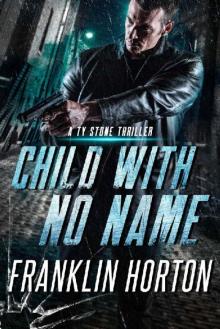 Child With No Name
Child With No Name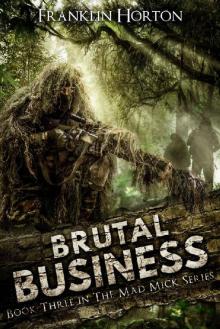 Brutal Business: Book Three in the Mad Mick Series
Brutal Business: Book Three in the Mad Mick Series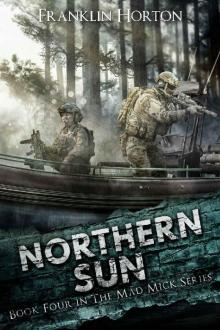 Northern Sun: Book Four in The Mad Mick Series
Northern Sun: Book Four in The Mad Mick Series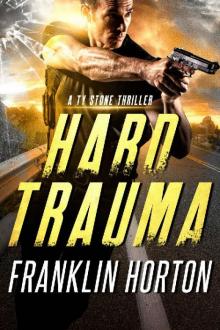 Hard Trauma
Hard Trauma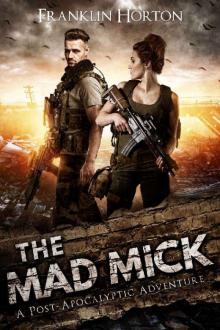 The Mad Mick: Book One of The Mad Mick Series
The Mad Mick: Book One of The Mad Mick Series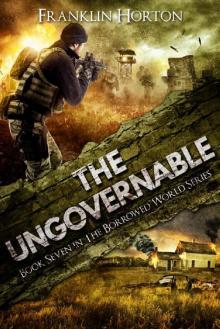 The Ungovernable
The Ungovernable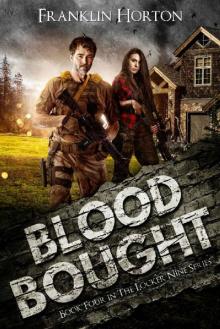 Blood Bought: Book Four in The Locker Nine Series
Blood Bought: Book Four in The Locker Nine Series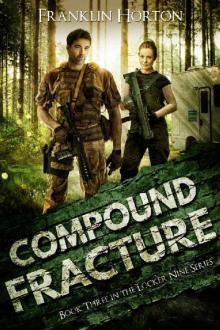 Compound Fracture
Compound Fracture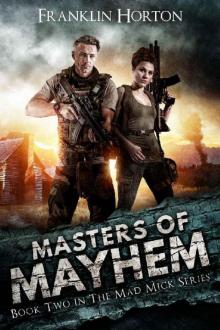 Masters of Mayhem
Masters of Mayhem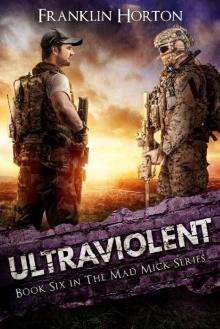 Ultraviolent: Book Six in The Mad Mick Series
Ultraviolent: Book Six in The Mad Mick Series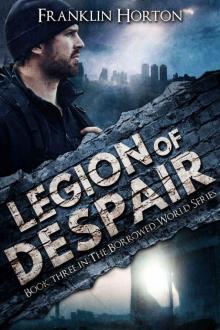 The Borrowed World (Book 3): Legion of Despair
The Borrowed World (Book 3): Legion of Despair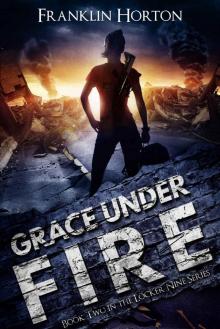 Grace Under Fire: Book Two In The Locker Nine Series
Grace Under Fire: Book Two In The Locker Nine Series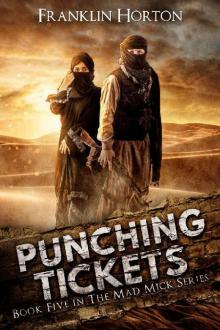 Punching Tickets: Book Five in The Mad Mick Series
Punching Tickets: Book Five in The Mad Mick Series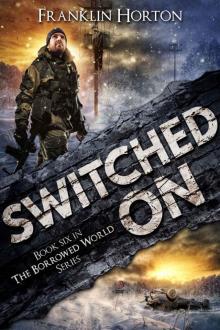 Switched On: Book Six in The Borrowed World Series
Switched On: Book Six in The Borrowed World Series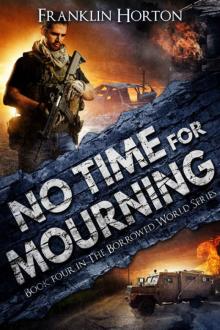 No Time For Mourning: Book Four in The Borrowed World Series
No Time For Mourning: Book Four in The Borrowed World Series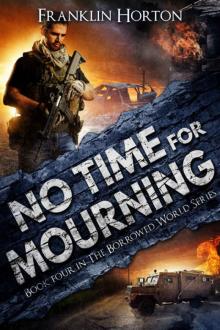 The Borrowed World (Book 4): No Time For Mourning
The Borrowed World (Book 4): No Time For Mourning Random Acts
Random Acts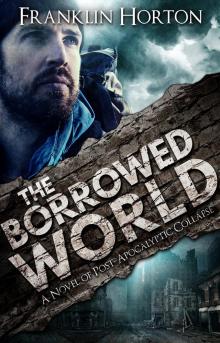 The Borrowed World: A Novel of Post-Apocalyptic Collapse
The Borrowed World: A Novel of Post-Apocalyptic Collapse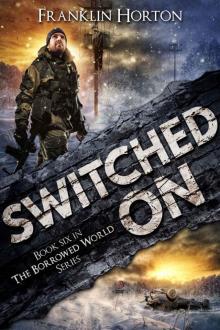 Switched On
Switched On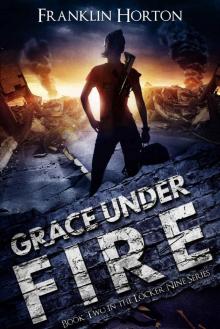 Grace Under Fire
Grace Under Fire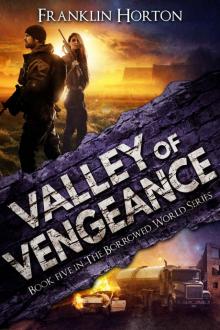 Valley of Vengeance: Book Five in The Borrowed World Series
Valley of Vengeance: Book Five in The Borrowed World Series